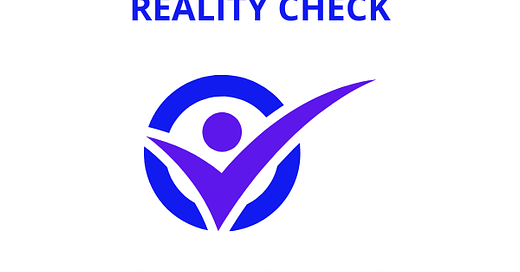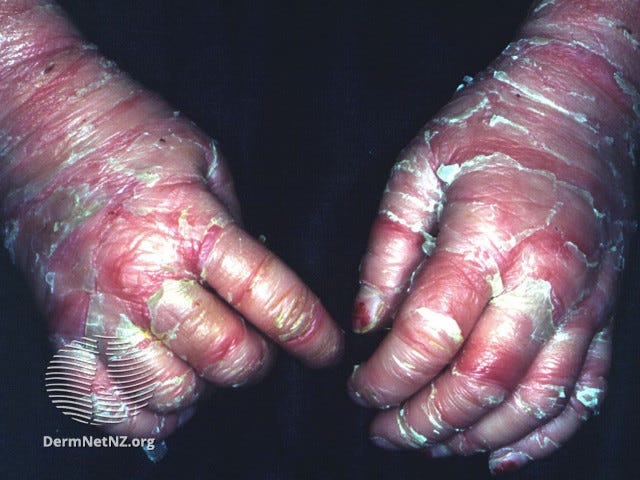At my old job, one of my nicknames was “Reality Check Woman.” This was my secret superhero identity. My superhero would drop in (we imagined) to bullshit conversations and bring the convo back to Reality, however harsh. I have decided to shorten the name of this publication to Reality Check so that other writers may be invited to add their two cents.
Because of the political climate of the place where I worked, the degree to which one could be plainspoken or have to couch the truth in platitudes and “aspirational” language depending on who was in the meeting when the truth bombs were dropped. It was the favorite part of my job.
Because I have an obvious disability, epidermolytic ichthyosis, and attended meetings in my power wheelchair, people might have been a little shier than usual when disagreeing with me on topics that included disability issues, including the law and policy.
These are not my hands, but they look like mine. I have this genetically caused skin disorder all over my body, but it appears worst on my hands and feet. It is on my face, but if you only saw it, you wouldn’t think I had a severe skin disorder.
From the beginning
I have had a reality-filled journey. I was born with my disability, which caused me to be assigned to “special ed” (special education), a segregated educational program for students with various types of disabilities because the school district couldn’t figure out what to do with me. I could read, was independent in the context of being at school, and was very funny looking. Assignment to special ed was the first place in my journey where there was a sharp turn.
In the early 1960s, my county had a central school where children were bussed from all over the county. My parents were both elementary school teachers at this time (for their entire working lives). Still, I don’t think they a) knew how different the special education program was to “regular” school, and b) neither of them wanted to rock the boat to try and keep me in our local (4 blocks away) elementary school.
I intend to write more about this experience later, but I wanted to mention it here to show how early my disability determined my course. I remained in special ed until I went to high school.
Many disabilities, many experiences
I am now sixty-five and retired, except for writing and consulting on disability-related issues. I beat the odds in a couple of respects.
I mostly worked throughout my adulthood, except for my years in law school, in my 30s. I retired in October 2022 from a prestigious university after 27 and a half years of service, ending as an “Executive Director, emerita.” While I had several roles before the last one, my entire career there was spent serving students with disabilities.
I graduated from law school in 1993 and have been working in the field of disability civil rights ever since.
Along the way, I have acquired additional disabilities: osteoarthritis, chronic depression, anxiety, and a not entirely diagnosed problem with my shoulders, affecting how much time I can use my arms. (Probably a combo of arthritis and torn tendons, possible rotator cuff injury.)
Having disabilities beats the alternative.
The truth is 1 out of 4 people have a disability. Unless you are a track star that gets hit by a bus, you are likely to acquire one or more disabilities before you die. The information I want to share will likely be helpful to you or someone you know.
I can’t speak to the laws of other countries, but I am pretty familiar with the civil rights laws for people with disabilities in the United States. I am not a practicing attorney, so you can’t depend on my advice in the legal sense, but you can certainly use it as a starting place from a practical standpoint.
There is still a tremendous stigma about claiming the label “person with a disability” or “disabled person” (I use them interchangeably.) Many people will say that they have “a disease” (which may be the cause of their disability) but don’t want to say, “I have a disability, and I need a wheelchair at the airport to get from the front door to the gate.”
Get the fuck over it. Seriously. Not the instance of your disability but your willingness to claim it. The stigma persists because disability scares people. The only way we will change that is for people to understand and accept that disability is a natural part of life. A disability may make it harder or impossible to do some things, but it doesn’t necessarily mean you can’t do anything. Depending on the nature of your disability, you may have a limitation in only one or two areas. Or, you may be severely disabled and need a high degree of assistance and accommodation.
Everyone’s situation is different and usually changes over time. Technological developments can make a huge difference. Medical advancements might help, but I don’t think one should count on either. Attitude (your own and that of the public, your family, and the people you encounter daily) makes a tremendous difference.
I don’t mean that your good attitude will get your wheelchair up a flight of stairs. I mean that your attitude in finding alternatives to the stairs and reminding vendors of their legal obligations to be accessible can make you feel more empowered and less a victim of circumstance. (And still, be pissed at the inconvenience!)
Deep Breath
Let’s do this! I will post about various disability-related issues — with breaks for rants about other topics. If you have topics or questions you would like discussed, let me know in the comments.






